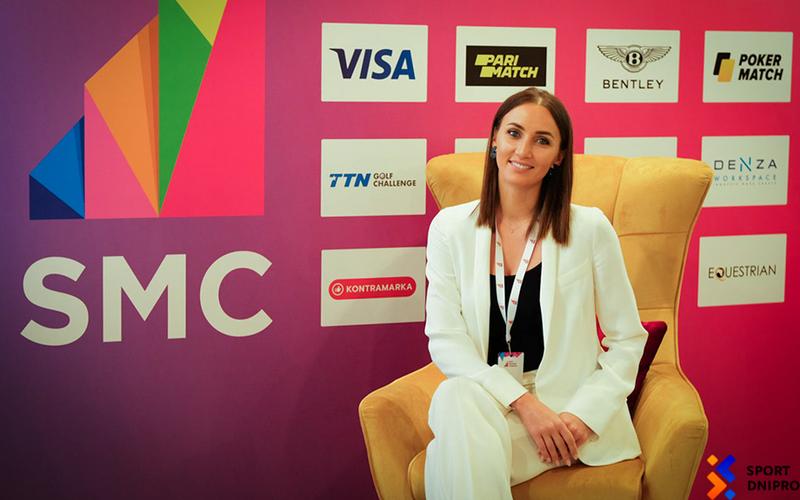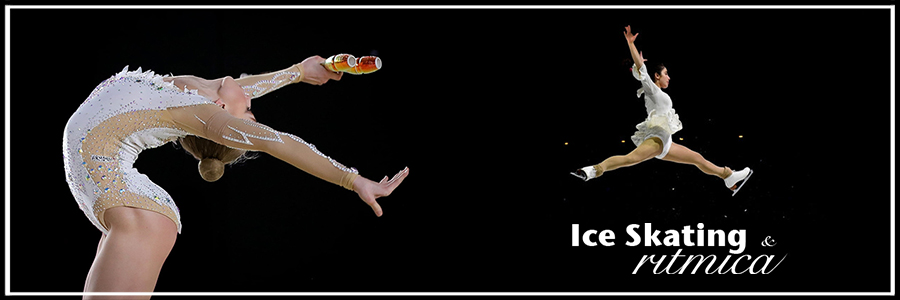|
|
|
Ganna Rizatdinova - la ginnastica ritmica è una scuola di sopravvivenza: qualcuno resiste e qualcuno si rompe
23.05.2019
Fonte
by Ekaterina Kondaurova.

La figura esatta, la grazia dei movimenti, un sorriso sempre smagliante. Siamo abituati a vedere le ginnaste così. Ma cosa si nasconde dietro a questo bel ritratto? Allenamenti pesanti, crisi e lacrime, esaurimento fisico. Anna Rizatdinova, ginnasta ucraina, più volta campionessa mondiale ed europea, bronzo alle Olimpiadi 2016 a Rio, ci ha parlato sinceramente del lato oscuro della ginnastica ritmica.
Raccontaci un po' del tuo sentiero verso la medaglia olimpica: come è apparso questo obiettivo, quanto tempo ci è voluto per prepararsi?
A 5 anni, quando ho iniziato la ginnastica, nessuno mi aveva profetizzato un futuro da star. Mi piaceva muovermi con un nastro, una palla ma non avrei mai pensato di raggiungere tali traguardi. Inoltre in ginnastica ci sono parametri ideali. Non avevo abbastanza crescita, flessibilità. Senza dubbio il mio talento è il duro lavoro. Con il tempo, ho avuto l'obiettivo di entrare nella scuola Deriugina, poi di diventare la numero uno della nazione, poi del mondo. Bene, solo allora, di certo, ho capito che avrei potuto prendere una medaglia alle Olimpiadi.
Sono andata alle Olimpiadi capendo che il primo e secondo posto erano già prenotati, quindi non ho diviso tra oro, argento e bronzo: per me queste medaglie hanno lo stesso valore. La cosa più importante è aver raggiunto i Giochi ed essere salita sul podio.
Cosa significa "primo e secondo posto prenotati"?
Non è un segreto che la ginnastica sia uno sport soggettivo. Ma credo che in una tale gara ai Giochi olimpici, nessuno possa far finta di non notare un errore. La ginnasta che ha vinto l'argento ha fatto cadere due clavette durante la sua performance. Questo è abbastanza per non poter più gareggiare per il podio.
Ci sono stati molti commenti rivolti a me, che il mio programma fosse più facile degli altri, ma non è così. A quel tempo il punteggio massimo era 10. Ed in tutte le schede delle ginnaste ve ne erano dozzine (per me, le russe, le bielorusse, le koreane).
Ti penti di tutto il tempo dedicato allo sport?
Non me ne pento perché sono riuscita a vincere una medaglia, quindi probabilmente il mio percorso è stato difficile ma giusto. Mi sono riparata in me stessa contro tutto e dedicata completamente allo sport, questo mi ha aiutato. Sì, in qualche modo, non c'è stata infanzia, ma ora parlerò alla conferenza di sport internazionale per lanciare il mio marchio. Ci sono vantaggi e non mi pento di nulla, sono felice di essere stata introdotta allo sport. Anche se ho pensato che molte volte non fosse la strada giusta, specialmente quando qualcosa non ha funzionato per lungo tempo e non ci sono stati risultati.
Cosa, in quei momenti, ti ha aiutato a non mollare ed andare avanti?
Il supporto da parte dei genitori e degli affetti. E la coach mi ha aiutato, di certo. Nelle atlete in età matura, una coach è un'amica con cui condividere tutte le tue preoccupazioni e problemi e non una guardia che sta costantemente col bastone in mano a rimproverarti per il minimo errore. Ho avuto un'amica così in Irina Deriugina. Sono felice che prima delle Olimpiadi fosse con me: non avevo bisogno di essere forzata, sgridata, volevo solo supporto.
Ma la ginnastica ritmica è uno sport duro. E un'allenatore usa il metodo del bastone piuttosto che quello della carota, non è vero?
Nelle atlete di giovane età sì, Ma tutto ha una sua misura. Bisogna avere un controllo severo sui bambini, specialmente la generazione corrente, per cui tutto è semplice ed accessibile e che non immagina neanche quanto sia crudele la strada verso la medaglia olimpica.
Quando sono arrivata a Kiev, a 16 anni, avevamo dure e spartane condizioni. Vivevo in un collegio sportivo. Albina Nikolaevna Deryugina disse a mia madre che se voleva che crescessi in una società normale, indipendente e non viziata, avevo bisogno di vivere in una scuola sportiva assieme ad altre ginnaste. Alle dieci di sera si spegneva la luce, non c'erano supporti elettrici, ma solo una doccia per l'intero edificio. Gli allenamenti erano i più duri. Me lo ricordo e non so nemmeno come ho fatto a sopportare tutto. Sì, è stata dura, ma mi ha fortificata. Nella fase iniziale si ara. Poi, quando una persona si approccia in modo cosciente agli allenamenti, la coach diventa alleata ed amica.
Qualcuno si fortifica e qualcuno si rompe. Quanto fa mormorare questa situazione le ginnaste?
Capiscono semplicemente che lo sport ad alto livello non fa per loro e lasciano. E' una scuola di sopravvivenza: qualcuno resiste ed attraversa queste condizioni, duri allenamenti, umiliazioni, qualche insulto rivolto a lei, ma altre si rompono. Ma, dall'altro lato, si sviluppa un tale carattere che, per le Olimpiadi, niente spaventa più. Quindi ci sono pro e contro.
Come già detto, la carriera di una ginnasta finisce molto presto. Che si fa dopo?
Nel 2016 avevo già pensato al mio futuro. Ho cominciato a collaborare con un agente e mi ha aiutato, perché ho cominciato ad apparire in eventi sociali, televisione, sono diventata popolare. Prima lavori per un marchio, poi il marchio potrebbe lavorare per te. E molti olimpionici ne hanno bisogno perché nel nostro circuito siamo già star. Cambiare la mentalità degli atleti è molto difficile.
Secondo te, come può essere pubblicizzato lo sport nel nostro paese?
Attraverso i media, non c'è altro modo. Voglio che lo sport diventi un culto ed una priorità strategica nel nostro paese, in modo che non solo le stars del business ma anche gli atleti possano comparire sulle copertine dei giornali o invitati a TV shows. Nel nostro paese, le notizie sportive e le trasmissioni di eventi sportivi mondiali scompaiono nell'aria. Gli atleti non lavorano grazie a questo, ma nonostante questo.
CITAZIONE Ganna Rizatdinova - Rhythmic gymnastics is a school of survival: someone is withstand, and someone is breaking
The exact figure, the grace of movements, always a sparkling smile. We used to see gymnasts like that. But what is behind this beautiful picture? Heavy training, nerves and tears, physical exhaustion. Frankly, Anna Rizatdinova, a Ukrainian gymnast, a multiple world and European champion, a bronze medalist of the 2016 Olympic Games in Rio de Janeiro, told about the downside of rhythmic gymnastics.
Tell us a little about your path to the Olympic medal: how did this goal appear, how much time did it take to prepare?
In 5 years, when I came to rhythmic gymnastics, no one prophesied my star future. I liked to move with a ribbon, a ball, but I didn’t even think that I could achieve such heights. Moreover, in gymnastics there should be ideal parameters. I did not have enough growth, flexibility. Definitely my talent is hard work. Over time, I had a goal to get into the school of the Deryugin, then - to become the first number of the country, then - the world. Well, and then I, of course, understood that I could take a medal at the Olympic Games.
I went to the Olympics and understood that the first and second places were already booked, so I did not divide gold, silver and bronze: for me these medals of the same value. The most important thing is that I reached the Olympic Games and climbed onto a pedestal.
What does “first and second places booked” mean?
It's no secret that gymnastics is a subjective sport. But I think that in such competitions as the Olympic Games, one cannot help noticing an error. A gymnast who won a silver medal dropped 2 maces during her performance. That is about any pedestal could not speak any more.
There were a lot of comments addressed to me, that my program is easier than others, but it’s not. At that time, the maximum score was 10 points. And all the gymnasts in the referee's card were dozens (for me, Russians, Belorussians, Korean women).
Do you regret that all your time was occupied by sports?
I do not regret it, because I managed to win a medal, so, probably, my path was difficult, but correct. I shielded myself from everything and devoted completely to the sport, and it helped me. Yes, somewhere there was no childhood, but now I am speaking at the international sports conference, launching my brand. There are pluses, and I do not regret anything, I am happy that I was sent to the sport. Although I thought many times that maybe this is not the right way, especially when something did not work for a long time and there was no result.
What at such moments helped you not to give up and move on?
Support for parents and loved ones. And the coach helped, of course. In the athlete’s conscious age, a coach is a friend with whom you can share all your worries and problems, and not a guard who constantly stands with a stick and scolds for the slightest mistake. I had such a friend Irina Deryugin. I am happy that before the Olympics in Rio de Janeiro she was with me: I did not need to be forced, scolded, I just needed support.
But rhythmic gymnastics is a tough sport. And the trainer, rather, uses the method of a whip, rather than a carrot. Isn't that right?
At an early age athletes - yes. But everything has its own measure. There should be strict control over children, especially the current generation, for whom everything is simple and accessible and which do not even suggest what the cruelest way to the Olympic medal is to go.
When I arrived in Kiev at the age of 16, we had tough Spartan conditions. I lived in sport internate. Albina Nikolaevna Deryugina told my mom that if she wants me to grow up in a normal society, be independent and not spoiled, then you need to live in sports school together with other gymnasts. At 10 o'clock in the evening they turned off the light, there were no electrical appliances, there was only one shower for the whole sport internat. The trainings were the toughest. I remember this and I do not even know how I endured it all. Yes, it was hard, but it hardened me. Therefore, at the initial stage only plowing. And then, when a person consciously approaches training, the coach becomes an ally and a friend.
It hardens someone, and it breaks someone. How much does such a situation mumble the gymnasts?
They just understand that big sport is not for them, and they leave. This is a survival school: someone endures and goes through such conditions, hard training, humiliation, some insults in his address, and it breaks someone. But on the other hand, for the Olympics, such a character is developed that nothing is scary anymore. So there are pros and cons.
As already mentioned, the career of gymnasts ends very early. What to do next?
In 2016, I already thought about my future. Started to cooperate with the agent. And it helped me, because I began to appear on social events, on television, and became recognizable. First you work for a brand, and then the brand should work for you. And many Olympians do not need it, because in our circle we are already stars. Changing the mentality of athletes is very difficult.
In your opinion, how can sport be popularized in our country?
Through the media, there is no other way out. I want sport to become a cult and a strategic priority in our country, so that not only show business stars, but also athletes should be invited to the covers of magazines and TV shows. In our country, sports news and broadcasts of world sporting events disappear from the airs. Athletes do not work thanks to, but in spite of.
Author: Ekaterina Kondaurova. |
|





